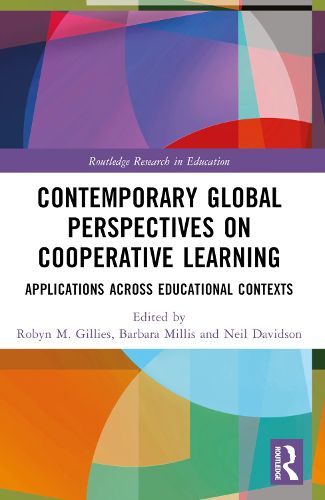Readings Newsletter
Become a Readings Member to make your shopping experience even easier.
Sign in or sign up for free!
You’re not far away from qualifying for FREE standard shipping within Australia
You’ve qualified for FREE standard shipping within Australia
The cart is loading…






This volume captures contemporary global developments in cooperative learning (CL) across varied educational contexts, levels, and disciplines.
Cooperative learning is widely recognized as a pedagogical practice that promotes socialization and learning among students, from kindergarten to tertiary education and across different subject domains. With chapters from contributors throughout the Global North and South, this comprehensive volume offers a wide-ranging perspective and addresses a range of cooperative learning pedagogies including relational, online, and peer learning, STAD, the Jigsaw model, and dialogic talk. The chapters draw on novel empirical research and theory to highlight best practices in cooperative learning, whilst also considering the challenges, limitations, and factors which drive or inhibit learner engagement and success. Consistent attention is given to the pivotal role of the educator in implementing cooperative learning to maximum benefit to enhance students' affective, social, cognitive, and metacognitive learning.
Thus, this book will appeal to scholars and researchers across a variety of subjects; and will provide an additional benefit to in-service and pre-service educators who already practice cooperative learning in their classrooms, as well as those who are interested in implementing the model.
$9.00 standard shipping within Australia
FREE standard shipping within Australia for orders over $100.00
Express & International shipping calculated at checkout
This volume captures contemporary global developments in cooperative learning (CL) across varied educational contexts, levels, and disciplines.
Cooperative learning is widely recognized as a pedagogical practice that promotes socialization and learning among students, from kindergarten to tertiary education and across different subject domains. With chapters from contributors throughout the Global North and South, this comprehensive volume offers a wide-ranging perspective and addresses a range of cooperative learning pedagogies including relational, online, and peer learning, STAD, the Jigsaw model, and dialogic talk. The chapters draw on novel empirical research and theory to highlight best practices in cooperative learning, whilst also considering the challenges, limitations, and factors which drive or inhibit learner engagement and success. Consistent attention is given to the pivotal role of the educator in implementing cooperative learning to maximum benefit to enhance students' affective, social, cognitive, and metacognitive learning.
Thus, this book will appeal to scholars and researchers across a variety of subjects; and will provide an additional benefit to in-service and pre-service educators who already practice cooperative learning in their classrooms, as well as those who are interested in implementing the model.